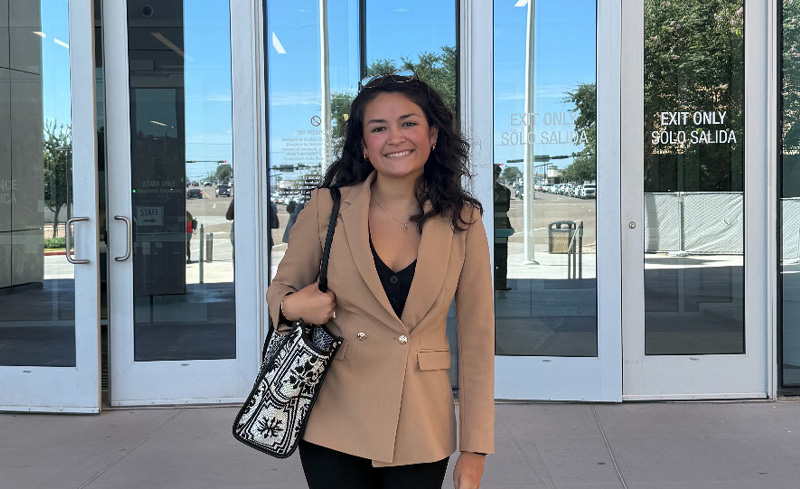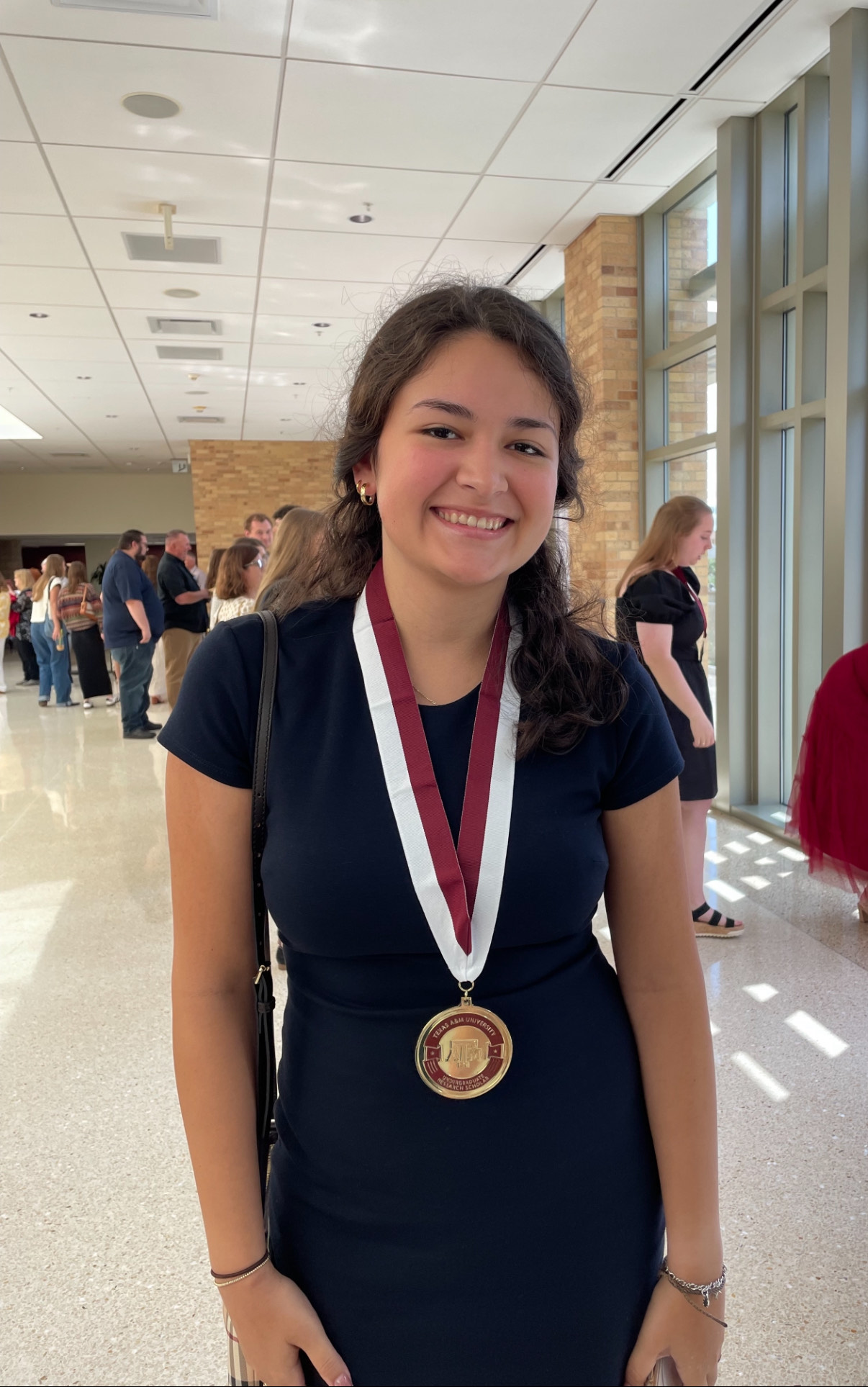
Born in McAllen, Texas, Daniela Villaseñor-Ramos ’25 and her family lived in Reynosa, Tamaulipas, Mexico until she was five, when they to McAllen permanently. Growing up in the Rio Grande Valley with a keen sense of community and a desire to help others, she knew at an early age that she wanted to become an attorney.
“Seeing the challenges that legal immigrants face in the criminal justice system inspired me to learn about both immigration and criminal law,” said Villaseñor-Ramos.
Society, Ethics and Law
With the goal of pursuing a law degree, Villaseñor-Ramos enrolled in Texas A&M University pursuing a university studies degree with a concentration in Society, Ethics, and Law (SEAL)with minors in philosophy and business. The SEAL concentration has since become a stand-alone major within the Department of Philosophy.
The Bachelor of Arts in Society, Ethics, and Law is designed for students preparing for careers in law, community service or related fields. Students take classes in moral, social, political and legal philosophy, in historical and social science methodologies and are well-prepared to pursue careers in law, education, public service, religion or non-governmental organizations. Designed for those who are curious about the law, SEAL closely attends the American Bar Association’s recommendations for undergraduates preparing for the Law School Admission Council test.
“SEAL is for students who want to put their Aggie core values of respect, excellence, leadership, loyalty and selfless service into practice through their careers,” said Dr. Kristi Sweet, head of the Department of Philosophy.
“SEAL students develop research, writing, presentation, problem-solving and critical thinking skills,” said Dr. Linda Radzik, professor and associate head of the Department of Philosophy and architect of the SEAL program. “This coursework helps students acquire the intellectual maturity and flexibility that will be needed in an unpredictable job market with the rise of artificial intelligence.”
Villaseñor-Ramos took two classes from Radzik: the philosophy of law and advanced topics in philosophy of law. She was engaged in classroom discussions and met with Radzik during office hours to ask questions and discuss information presented in the lectures.
“Her motivation to pursue a law career was evident, and she demonstrated excellent critical thinking skills and creativity,” said Radzik. “She is passionate about criminal and immigration law, and she wants to help her community.”
Research Challenge
Radzik asked Villaseñor-Ramos if she would be interested in participating in Texas A&M’s Undergraduate Research Scholars Thesis Program. During the two-semester program, undergraduate students conduct independent research, write a formal thesis and give a public presentation. Villaseñor-Ramos saw the benefits of the program even though it was not a class assignment or credit.
“I was able to choose a research subject that was important to me and relevant for the type of law I plan to practice in the future,” said Villaseñor-Ramos. “The opportunity to have Dr. Radzik as a sounding board and to collaborate closely with her throughout the project was also a strong incentive.”
Villaseñor-Ramos researched topics, discussed options with Radzik and with attorneys at Rene A. Flores Law Firm where she interned over several summers. Eventually she focused her project on a 2010 U.S. Supreme Court case.
Padilla v. Kentucky
José Padilla, a legal non-citizen U.S. resident for over 40 years and U.S. military veteran, was arrested in Kentucky for transporting marijuana. His attorney failed to counsel him about the potential impact a guilty plea might have on his immigration status and wrongly assured him that his residency and veteran status would prevent deportation. Upon pleading guilty, Padilla learned that his immigration status had been adversely affected by the verdict, and he would be deported automatically.
“The Sixth Amendment guarantees defendants the right to be represented by effective counsel for criminal cases, regardless of their citizenship,” said Villaseñor-Ramos. “Immigration and criminal law are two distinct specialties, and at the time of the Padilla case, the civil nature of immigration law did not entitle non-citizens to representation for their immigration matters.”

Padilla took his case to the U.S. Supreme Court, and they ruled in his favor, establishing the “Padilla Standard,” which requires defense attorneys to inform noncitizen criminal defendants about the possible adverse immigration consequences of pleading guilty to a deportable crime.
Villaseñor-Ramos studied the case, read numerous articles about the court’s decision and collaborated with colleagues and scholars. After reading a book written by Cesar Cuathemoc Garcia Hernandez, A.B., J.D., a professor, criminal and immigration law expert and the Gregory H. Williams Chair in Civil Rights and Civil Liberties at Ohio State University, she contacted him to discuss her thesis.
“He helped me understand the counter argument to expanding the Padilla Standard to require all criminal defense attorneys to become more knowledgeable about immigration law,” she said. “The additional educational and practice burdens could negatively impact the quality of their work and lead to poor outcomes for clients.”
From Student to Scholar
Villaseñor-Ramos says that the experience broadened her perspective while deepening her understanding of the law and how it evolves over time.
“My research project was one of the most rewarding aspects of my undergraduate career,” she said. “I developed stronger research, writing and speaking skills and I learned a lot about criminal and immigration law and the challenges that both the defendants and attorneys face when the two legal disciplines intersect.”
Villaseñor-Ramos presented her thesis “Re-evaluation of Padilla v Kentucky — Is the Current Standard Enough?” at Texas A&M’s Student Research Week and won a $300 award.
Radzik witnessed even more growth.
“The process of conducting independent research, writing and presenting the findings changes students,” said Radzik. “It is at that point that they go from being a student to being a scholar.”
Texas A&M offers students several high-impact learning opportunities including undergraduate research projects, internships and study abroad experiences. Many of these experiences are possible only through the generosity of donors who fund scholarships, summer support for research projects and awards for study abroad programs. As a student from a low-income family background, Villaseñor-Ramos needed significant financial aid to attend Texas A&M in pursuit of her dream to become an attorney.
Rio Grande Valley to Aggieland
Villaseñor-Ramos graduated from Sharyland High School in Mission, Texas.
“Texas A&M offered me scholarships, grants and a part-time job through the Federal Work-Study program which opened the door for me to become an Aggie and complete my undergraduate degree,” she said.
Villaseñor-Ramos received donor-funded scholarships from the Stars Scholarship Fund, Stars Texas A&M Matching Program, Texas A&M Aggieland Bound and Hispanic Scholarship Fund Scholar. In fall 2025, she began classes at South Texas College of Law Houston.
Help Us Prepare Them For Careers And Global Citizenship
Every student, like Daniela Villaseñor-Ramos, deserves the chance to step beyond the classroom and into experiences that challenge, inspire and prepare them for success. In the College of Arts and Sciences, high-impact learning opportunities are transforming lives. We invite you to be part of that transformation. Learn more on our website, or contact Ophelia Bennett, chief development officer, at obennett@tamu.edu or 979-862-1546.
